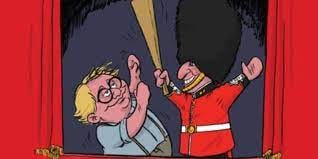Tuvia Tenenbom's travels in Britain and Ireland leave him sadder and wiser.
From the cover of The Taming of the Jew
Tuvia Tenenbom is perhaps the most successful author to experience extreme levels of difficulty in getting his books published in English.
I Slept in Hitler’s Room and Catch the Jew, his books about antisemitism in Germany and the Middle East, were published in Germany and Israel and became bestsellers. Despite this success, his subsequent book about American Jews and antisemitism couldn’t obtain a publisher in America. He was told that it would upset American Jews.
Now he has a new book out, The Taming of the Jew, a pointed, savage and often comic travelogue about attitudes in Britain and Ireland. And guess what? He couldn’t find a British publisher. So it’s been published in English by his Israeli publisher, Gefen.
The reason for Tenenbom’s difficulty is that he frightens people. He does so by lifting a curtain to expose not only antisemitism in places where people don’t want to admit it exists, but also the often craven attitudes towards it of some diaspora Jews.
The methods he uses also provoke unease. That’s because he often pretends to be something he is not, in order to lull people into speaking in an unguarded fashion. Think Sacha Baron-Cohen with blond hair, a large belly and a passing resemblance to Falstaff.
He gets people to say things which are so outrageous that readers sometimes can’t believe they really said it. In response, he maintains that he and his wife tape-record or video every encounter.
A former playwright and theatre director, he gets people to say these things through what some might call an act, and others might call a trick.
For Tenenbom, who wrote a column for the German paper Die Zeit for many years, often introduces himself as a German or half-Jordanian reporter. When he does so, certain people assume he is an antisemite. So believing that they’re talking to a kindred spirit, they come out with ripe examples of antisemitism.
But Tenenbom is an Israeli who was born in Bnei Brak, was a precocious Talmud scholar before he departed for the worlds of mathematics and the theatre, and despite his comic writing is driven by the high-minded and increasingly desperate aim to out the enemies of the Jewish people.
In his new book, he finds the most extreme Israel and Jew-bashers in Ireland and Scotland. He quotes a lapsed Catholic in Dublin who, asked for the one issue that unites the Irish, replies that Ireland is “the most anti-Israel, anti-Jewish country in Europe — though we will say that we are just anti-Zionist”.
He finds the students at Gateshead yeshiva living in constant fear of attack. He finds Manchester Jews under repeated onslaught from firebombs, physical attacks and verbal abuse, after they tell him falsely that there are no problems “because it’s painful to admit that so many people hate you”.
With his researches coinciding with the controversy over Jeremy Corbyn, he manages to interview him and concludes: “Jeremy is a really nice man who really doesn’t like Jews”.
After interviewing many others, Tenenbom concludes that the real issue isn’t Corbyn. “It’s the people who are antisemites and it doesn’t matter what Jeremy Corbyn is or is not”.
Most excruciating, he finds perfectly “tamed” British Jews who equivocate about the Jew-hatred in their country. Believing they are lying to him, he turns off his recording equipment on one occasion and asks the Jewish peer he’s interviewing to speak off the record.
Tenenbom writes: “And what he said off the record was exactly the opposite of what he told me on the record. What did he tell me off the record? Well, here goes: antisemitism is ingrained in society, and in the highest levels of it; the Foreign Office is populated with anti-Israel, antisemitic officials; self-hating Jews lead antisemitic political organisations in Britain.”
Keen to sample some British dramatic excellence, Tenenbom goes to the theatre but finds to his disappointment that most of these productions are merely dreary left-wing propaganda diatribes.
His insight is to realise that the real theatre is supplied by Britain itself. As the “outstandingly proper English” and anti-Brexit Belinda tells him in Derbyshire, the English are “probably” actors; when Tenenbom parses this as “the highest point of your culture is lying, pretending that you’re someone else,” Belinda and her husband agree.
Observes Tenenbom: “The two greatest shows on earth are playing in London right now; real life Absurdist dramas: Brexit and antisemitism”.
In the end, he appears to be as perplexed by Britain’s contradictions as he is discomfited. He has an image of it in his head that he admires; and yet he hates the anti-Jewish bigotry infusing its culture.
His conclusion, however, is unsparing: “I am leaving Britain, and I will never come back, my eagle says to me. Why? There are too many antisemites here, says my eagle, two teardrops falling from its eyes onto my face as it flies fast into the far heavens”.
The tears of many other eagles have been falling with them.


.jpeg)